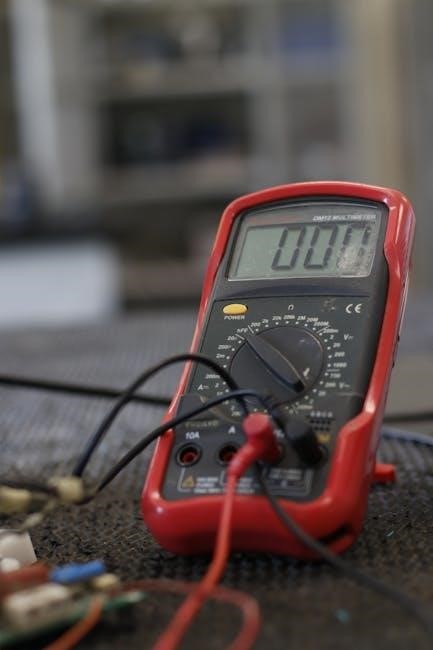Electronic Technician Certification is a credential validating expertise in electronics. It enhances career prospects and ensures proficiency in troubleshooting and maintaining electronic systems. Free PDF resources offer convenient study materials for exam preparation, covering essential topics and practical skills. Certification demonstrates a strong foundation in electronics, making it a valuable asset for professionals in the field.
1.1 Importance of Certification for Electronics Technicians
Certification is crucial for electronics technicians as it validates their expertise and commitment to the field. It enhances career opportunities, boosts credibility, and demonstrates a strong understanding of electronic systems. Free PDF resources and practice tests provide accessible tools for preparation, ensuring technicians are well-equipped to meet industry standards and tackle complex challenges effectively.
1.2 Overview of the Certification Process
The certification process involves a structured approach to assess knowledge and skills. It typically includes passing a comprehensive exam, often preceded by studying free PDF materials and practice tests. The exam covers key topics like circuit analysis and digital systems, ensuring technicians meet industry standards. Successful completion grants a recognized credential, verifying their expertise in electronics.
Benefits of Using Free PDF Resources
Free PDF resources provide cost-effective study materials, making exam preparation accessible to everyone. They offer convenience, allowing candidates to study anytime, enhancing their understanding of key concepts and skills.
2.1 Cost-Effective Study Materials
Free PDF resources eliminate the need for expensive textbooks, offering high-quality study materials at no cost. These downloadable files provide access to practice tests, theory explanations, and exam guides, making them an affordable option for everyone. They enable candidates to prepare thoroughly without financial strain, ensuring equal opportunities for all aspiring electronic technicians to excel in their certification exams.
2.2 Accessibility and Convenience
Free PDF resources are easily downloadable, ensuring access to study materials anytime, anywhere. They can be viewed on various devices, offering flexibility for candidates with busy schedules. This convenience allows for self-paced learning, enabling individuals to prepare efficiently without time constraints, making exam preparation more manageable and stress-free for aspiring electronic technicians.
Understanding the Test Format
The exam includes multiple-choice questions and practical problems, assessing knowledge of electronic systems, circuits, and troubleshooting. Familiarity with the format is crucial for effective time management and scoring.
3.1 Types of Questions and Exam Structure
The exam features multiple-choice questions, true/false statements, and practical problem-solving tasks. The structure is divided into sections, focusing on basic electronics, circuit analysis, and digital systems. Each question is designed to assess theoretical knowledge and hands-on skills, ensuring comprehensive evaluation of an electronic technician’s expertise. Proper preparation involves understanding each question type and the overall exam layout to maximize scoring potential effectively.
3.2 Time Management and Scoring System
Effective time management is crucial, as exams typically last 3 hours with a set number of questions. The scoring system allocates points for correct answers, while some exams deduct points for incorrect ones. Practicing with free PDF resources helps candidates simulate exam conditions and improve pacing. Balancing speed and accuracy ensures optimal performance, making time management a key factor in achieving a high score.

Key Topics Covered in the Exams
The exams cover basic electronics, circuit analysis, digital and analog systems, and microcontrollers. These topics are extensively covered in free PDF resources, aiding in mastering essential concepts and practical applications.
4.1 Basic Electronics and Circuit Analysis
This section focuses on fundamental principles of electronics, including Ohm’s Law, series and parallel circuits, and electronic components. Free PDF resources provide detailed explanations and practice questions, helping candidates understand circuit behavior and analysis techniques. Mastering these concepts is crucial for diagnosing and repairing electronic systems effectively in real-world scenarios. These materials ensure a solid foundation for advanced topics and practical applications.
4.2 Digital and Analog Systems
Digital and analog systems form the core of electronic circuits. Free PDF resources cover key concepts like binary logic, analog-to-digital conversion, and signal processing. Practice questions help technicians understand the differences between digital and analog systems, ensuring proficiency in designing and troubleshooting. These materials are essential for mastering modern electronic systems and preparing for certification exams effectively.
4.3 Microcontrollers and Programmable Devices
Microcontrollers and programmable devices are integral to modern electronics, enabling control and interaction with external systems. Free PDF resources provide detailed study guides and practice questions on programming, troubleshooting, and applications. Key topics include Arduino, Raspberry Pi, and PIC microcontrollers, as well as I/O operations and memory management. These materials help technicians master practical skills and prepare for certification exams effectively.

Top Websites for Free PDF Downloads
Several websites offer free PDF resources for electronic technician exam preparation. These platforms provide reliable study materials, practice tests, and guides, ensuring convenient and cost-effective learning.
5.1 Reliable Sources for Study Materials
Websites like Archive.org, Electronics-Tutorials.ws, and AllAboutCircuits.com provide reliable study materials for electronic technician exams. These platforms offer free PDF downloads of practice tests, guides, and detailed explanations. They are trusted sources for comprehensive preparation, ensuring access to high-quality resources. Regularly updated content and user-friendly interfaces make them ideal for exam-focused learning. These sites cater to various skill levels, enhancing your readiness for certification exams.
5.2 Verified Platforms for Exam Preparation
Platforms like Udemy, Coursera, and edX offer verified study materials for electronic technician exams. These sites provide free PDF resources and structured courses. Additionally, forums like Reddit’s r/Electronics and specialized Facebook groups host communities for exam preparation. These platforms ensure access to reliable practice tests and interactive tools, aiding in comprehensive exam readiness and fostering a collaborative learning environment for success. They cater to diverse learning styles and preferences, enhancing overall preparation efficiency.

How to Effectively Use Practice Tests
Practice tests simulate actual exam conditions, helping identify weaknesses. Regularly review questions and answers to improve understanding and build confidence. Use results to focus on areas needing attention.
6.1 Simulating Exam Conditions
Simulating exam conditions helps build familiarity with the test format and timing. Use free PDF resources to access full-length practice tests. Set a timer and work through questions as if taking the actual exam. This approach improves time management and reduces anxiety, ensuring a more accurate assessment of readiness. Regular practice under exam-like conditions enhances problem-solving speed and accuracy, boosting overall performance.
6.2 Analyzing Results for Improvement
Analyzing practice test results is crucial for identifying knowledge gaps. Review missed questions and study their explanations to understand mistakes. Focus on weaker areas to improve comprehension and retention. Track progress over time to refine study strategies and build confidence. Regular analysis ensures targeted learning, enhancing overall performance and readiness for the actual certification exam.

Common Mistakes to Avoid
Common mistakes include misinterpreting question requirements and poor time management. These errors can lead to incorrect answers and reduced scores. Avoid rushing and ensure thorough understanding.
7.1 Misunderstanding Question Requirements
Misreading questions is a common pitfall, leading to incorrect answers. Test-takers often overlook specific details or misunderstand the context, especially under time pressure. Free PDF resources highlight the importance of careful reading and understanding each question’s requirements before attempting to answer. This ensures accuracy and avoids unnecessary errors, which can significantly impact scores. Proper preparation helps mitigate this issue.
7.2 Time Management Errors
Poor time management is a common issue during exams, leading to incomplete answers or rushed responses. Allocating insufficient time to complex questions can result in lower scores. Free PDF resources often include timed practice tests, helping candidates simulate exam conditions and improve pacing. Effective time management ensures all questions are attempted, minimizing errors and maximizing the final score.

Importance of Understanding Basic Concepts
Mastering fundamental principles of electricity and electronics is crucial for success. Free PDF resources emphasize basic concepts, enabling technicians to troubleshoot and solve problems effectively. A strong foundation ensures clarity in advanced topics and enhances practical application skills.
8.1 Fundamentals of Electricity and Electronics
Understanding voltage, current, and resistance is essential for electronics technicians. Free PDF resources cover basic principles, circuit analysis, and component functions. Mastering these fundamentals enables technicians to troubleshoot effectively and grasp advanced concepts. Topics like Ohm’s Law and circuit theory form the backbone of electronic systems, ensuring practical skills are grounded in solid theoretical knowledge.
8.2 Essential Tools and Equipment
Electronic technicians rely on tools like multimeters, oscilloscopes, and soldering irons for precise measurements and repairs. Free PDF resources detail the proper use of these tools. Essential equipment includes wire strippers, breadboards, and safety gear. Understanding and mastering these tools is fundamental for diagnosing and fixing electronic systems effectively, ensuring both accuracy and efficiency in professional and training environments.
Using Online Communities for Support
Online communities serve as valuable resources for electronic technicians, offering forums, knowledge sharing, and access to free study materials for efficient exam preparation.
9.1 Forums and Discussion Groups
Online forums and discussion groups provide valuable platforms for electronic technicians to share resources, ask questions, and collaborate. These communities often offer access to free PDF study materials, including practice tests and exam guides. Participants can engage with peers, clarify doubts, and gain insights from experienced professionals. Active participation in these forums enhances preparation efficiency and fosters a supportive learning environment, making them indispensable for exam success.
9.2 Peer Review and Knowledge Sharing
Peer review and knowledge sharing are essential for effective exam preparation. Online communities allow technicians to exchange study materials, such as free PDF resources, and gain insights from experienced professionals. Collaborative learning helps identify knowledge gaps and improves problem-solving skills. Sharing perspectives enriches understanding, while feedback from peers enhances confidence and readiness for the certification exam. This interactive approach fosters growth and mutual success in the field of electronics.

Final Preparation Tips
Review key concepts and practice with free PDF resources. Stay calm, manage time wisely, and avoid last-minute cramming. Utilize practice tests to refine your strategy and confidence for exam success.
10.1 Last-Minute Study Strategies
Focus on high-weight topics using free PDF resources. Use flashcards for quick revision of key formulas and concepts. Prioritize practice tests to identify weak areas and refine your approach. Simulate exam conditions to build time management skills. Stay calm, ensure proper rest, and review notes thoroughly before the test to maximize confidence and performance.
10.2 Staying Calm and Focused During the Exam
Maintain a calm mindset by practicing deep breathing and positive affirmations. Avoid distractions by focusing on one question at a time. Manage time effectively, ensuring you attempt all questions. Stay hydrated and energized with light snacks. A well-rested mind and proper nutrition enhance focus. Trust your preparation and approach each question with confidence to achieve optimal performance.















































